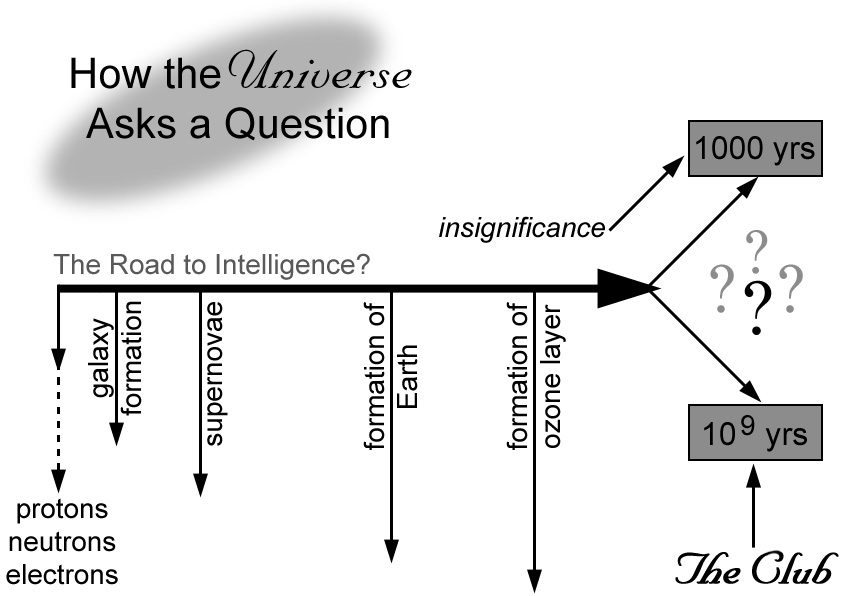
One Million Civilizations or Just OneWe conclude this Chapter by considering the implication of Nc = one million and give an argument as to why Nc might be just one. To most, one million civilizations capable of communication that exist right now would seem like a very large number. In reality, however, it is a very small number which indicates that intelligent life is rare, very rare, but not necessarily unique to this planet. There are approximately 1011 stars in our galaxy which means, in perspective, that there is only 1 civilization per 100,000 stars. That's rare. When you observe the night sky on a moonless night in a dark location, the number of stars that you can observe with your naked eye is 3-4,000 depending on the quality of your eyesight. Thus, within our naked eye horizon we may well be the only civilization present. But beyond our naked eye horizon is the vastness of the Galaxy, a fact that we can not emotionally appreciate and which biases us towards uniqueness. We are not readily cognizant that we can only interact, in a sensory manner, with an extremely limited volume of the Galaxy and the enormity of what lies beyond our sensory horizon is not something easily grasped.If we imagine that these 100,000 civilizations are randomly spread throughout the disk of our Galaxy, then the average distance to the nearest civilization is about 300 light years away from us. Even if we could develop a propulsion system that achieves a velocity of 0.1 c, it would take 3000 years to reach the nearest other civilization, presuming we know where it was in the first place. Moreover, although the civilization on the Earth does manifest itself by escaping Television and Military Radar (an ominous combination - perhaps this explains why no one has dropped in to say hello), it has only been doing this for 50 years so we would not expect any civilizations to have accidentally picked up our stray radio wave emissions. More to the point, however, is that our estimate of Nc = one million is based on a very long average lifetime per civilization. In fact, for reasonable probability values, Nc is more strongly dependent on L than any other term. This means that each one of these civilizations are considerably more advanced than us and have already gone down the pathway to be included in the Galactic Club. This perhaps is the most significant conclusion that one can draw from this statistical argument: civilizations with short lifetimes do not matter and have only a very small window of detection in the Galaxy. To claim our place among other intelligent civilizations in the Galaxy requires that we adopt a different system of planetary management such that we achieve sustainability. Perhaps then, we will even be invited to apply for membership in the Club. So far we have considered this hypothetical collection of one million civilizations to be static in nature. That is, they occupy their planet in an equilibrium state. However, perhaps curiosity causes them to develop space travel. Would it be possible for one of these civilizations to essentially colonize the entire Galaxy. Let's consider the following scheme:
The colonization argument presented above has been used to suggest that, in fact, Nc = 1 and that we are it. Earth. That's it, the sole keeper of the question marks in the Galaxy and perhaps the Universe. This is a disturbing thought as it implies an awesome responsibility on us earthlings. If we extinct ourselves we extinguish the very questions that the Universe has used to become self-aware. One resolution to this dilemma is simply that interstellar travel may be a lot more difficult than the above scheme suggests. Clearly, the average time of 10,000 years to reach another planet requires a multi-generation committment. The individuals that get on the spacecraft are not the same ones that get off 10,000 years later. Perhaps this is impossible. Then again, perhaps advanced cryogenics would make interstellar travel feasible. It's difficult to know. What we do know is that we are unmistakably here and we are observers of the Universe. Our knowledge of the Universe may be primitive, but if so, this is a reflection of the primitive nature of the questions that we ask. But we have been investigating the nature of the Universe for only about 10,000 years. In this flyspeck of time we can't hope to have gained fundamental knowledge. The challenge for us, which stems from the study of Cosmology, is to preserve our civilization and our species so that we will be able to make inquires about the nature of the Universe for millions of more years. Only then can we acquire wisdom and truly understand our connection to the Cosmos and whether or not we are alone |